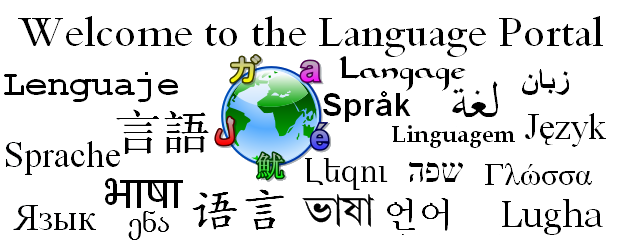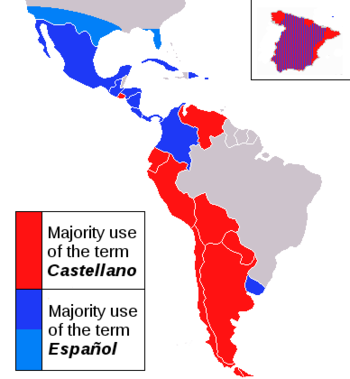Portal:Language
|
A language is a system of symbols, generally known as words, and the grammatical and other rules by which they are manipulated. The word language is also used to refer to the whole phenomenon of language, and in this sense language is one of several forms of human communication. The scientific study of language and languages, including their historical development, characteristics, and use in society, is the field of linguistics. Human language is a natural phenomenon, and language learning is instinctive in childhood. In using language, people use patterns of sound or gesture to convey the words and rules of language, or they represent these patterns in codes such as writing. There are thousands of languages, historically related to each other in many language families, and they share a number of common properties. Besides using naturally acquired language, people have consciously crafted languages such as Esperanto and Klingon. Selected language
Catalan (/ˈkætəlæn/; autonym: català [kətəˈɫa] or [kataˈɫa]) is a Romance language named for its origins in Catalonia, in what is nowadays northeastern Spain and adjoining parts of France. It is the national and only official language of Andorra, and a co-official language of the Spanish autonomous communities of Catalonia, the Balearic Islands, and the Valencian Community (where it is also known as Valencian). It also has semi-official status in the city of Alghero on the Italian island of Sardinia. It is also spoken with no official recognition in parts of the Spanish autonomous communities of Aragon (La Franja) and Murcia (Carche), and in the historic French region of Roussillon/Northern Catalonia, roughly equivalent to the department of Pyrénées-Orientales.
Catalan evolved from common Latin around the eastern Pyrenees in the 9th century. During the Low Middle Ages it saw a golden age as the literary and dominant language of the Crown of Aragon, and was widely used all over the Mediterranean. The union of Aragon with the other territories of Spain in 1479 marked the start of the decline of the language. In 1659 Spain ceded Northern Catalonia to France, and Catalan was banned in both states in the early 18th century. 19th-century Spain saw a Catalan literary revival, which culminated in the 1913 orthographic standardization, and the officialization of the language during the Second Spanish Republic (1931–39). However, the Francoist dictatorship (1939–75) banned the language again. Selected pictureGeographical distribution of the preferential use of the terms castellano (Castilian), in red, vs. español (Spanish), in blue, to refer to the Spanish language Selected topicStuttering (/ˈstʌtərɪŋ/; alalia syllabaris), also known as stammering (/ˈstæmərɪŋ/; alalia literalis or anarthria literalis), is a speech disorder in which the flow of speech is disrupted by involuntary repetitions and prolongations of sounds, syllables, words or phrases as well as involuntary silent pauses or blocks in which the person who stutters is unable to produce sounds. The term stuttering is most commonly associated with involuntary sound repetition, but it also encompasses the abnormal hesitation or pausing before speech, referred to by people who stutter as blocks, and the prolongation of certain sounds, usually vowels and semivowels. For many people who stutter, repetition is the primary problem. Blocks and prolongations are learned mechanisms to mask repetition, as the fear of repetitive speaking in public is often the main cause of psychological unease. The term "stuttering" covers a wide range of severity, encompassing barely perceptible impediments that are largely cosmetic to severe symptoms that effectively prevent oral communication. The impact of stuttering on a person's functioning and emotional state can be severe. This may include fears of having to enunciate specific vowels or consonants, fears of being caught stuttering in social situations, self-imposed isolation, anxiety, stress, shame, being a possible target of bullying (especially in children), having to use word substitution and rearrange words in a sentence to hide stuttering, or a feeling of "loss of control" during speech. Did you know
ArticlesLanguages of Africa: Arabic, Chadic, Cushitic, Kanuri, Maasai, Setswana, Swahili, Turkana, Xhosa, Yoruba, Zulu, more... Languages of the Americas: Aleut, Carib, Cherokee, Inuktitut, Iroquois, Kootenai, Mayan, Nahuatl, Navajo, Quechuan, Salish, American Sign Language, more... Languages of Asia: Arabic, Balochi, Bengali, Chinese, Japanese, Hebrew, Hindustani, Kannada, Marathi, Korean, Kurdish, Malayalam, Mongolian, Persian, Rajasthani, Sindhi, Sanskrit, Tamil, Tanchangya, Telugu, Tibetan, Thai, Turkish, Vietnamese, Khowar, more... Languages of Austronesia: Austric, Fijian, Hawaiian, Javanese, Malagasy, Malay, Maori, Marshallese, Samoan, Tahitian, Tagalog, Tongan, Auslan, more... Languages of Europe: Basque, Czech, Danish, Dutch, English (book), French, German, Greek, Italian, Latin, Leonese, Norwegian, Polish, Portuguese, Romanian, Russian, Slovak, Spanish, more... Constructed languages: Esperanto, Ido, Volapük, more... Agglutinative language, Analytic language, Constructed language, Creole, Context-free language, Extinct language, Dialect, Fusional language, Inflectional language, International language, Isolating language, Language isolate, National language, Natural language, Pidgin, Pluricentric language, Polysynthetic language, Proto-language, Sign language, Spoken language, Synthetic language, Variety (linguistics) Applied linguistics, Cognitive linguistics, Accent (dialect), Computational linguistics, Descriptive linguistics, Eurolinguistics, Generative linguistics, Historical linguistics, Lexicology, Lexical semantics, Morphology, Onomasiology, Phonetics, Phonology, Pragmatics, Prescription, Prototype semantics, Psycholinguistics, Semantics, Stylistics, Sociolinguistics, Syntax See also: List of linguists Alphabets: Arabic alphabet, Cyrillic alphabet, Hebrew alphabet, Latin alphabet, more... Other writing systems: Abjad, Abugida, Braille, Hieroglyphics, Logogram, Syllabary, SignWriting, more.. See also: History of the alphabet, Script CategoriesLinguistics: Computational linguistics • Grammar • Historical linguistics • Morphology • Phonetics • Phonology • Pragmatics • Reading • Semantics • Sociolinguistics • Syntax • Writing Languages: Language families • Pidgins and creoles • Sign languages Linguists: By nationality • Grammarians • Historical linguists • Morphologists • Phoneticians • Phonologists • Sociolinguists • Syntacticians • Translators Stubs: Constructed languages • Languages • Linguists • Pidgins and creoles • Typography • Vocabulary and usage • Writing systems
|



